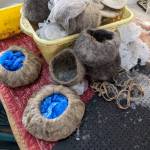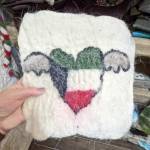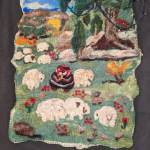Mosaic of Peace Reflection
by Mary Lee Hall
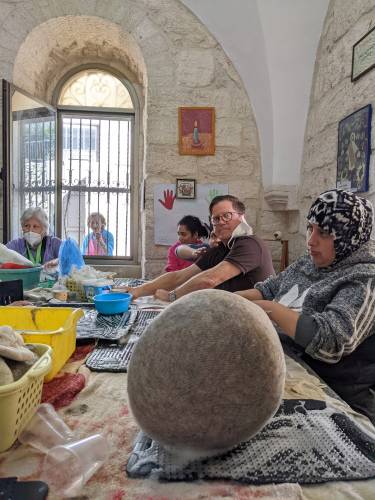 During the conference, I went with 3 others from the Mosaic of Peace to volunteer for a few hours with the L’Arche Community of Bethlehem. We were warmly welcomed into a seated circle of L’Arche staff and participants. Christians and Muslims were both staff and participants. L’Arche is a community of developmentally disabled adults. Other L’Arche communities are residential, but in Bethlehem, L’Arche functions as more of a support group/sheltered workshop which participants attend during the day but otherwise live with their families.
During the conference, I went with 3 others from the Mosaic of Peace to volunteer for a few hours with the L’Arche Community of Bethlehem. We were warmly welcomed into a seated circle of L’Arche staff and participants. Christians and Muslims were both staff and participants. L’Arche is a community of developmentally disabled adults. Other L’Arche communities are residential, but in Bethlehem, L’Arche functions as more of a support group/sheltered workshop which participants attend during the day but otherwise live with their families.
All in the circle clearly loved and supported one another and were so happy to be together. We were introduced and seated ourselves in the circle where we learned every name. Several participants spoke a little and spoke to us, others expressed their welcome with smiles and gestures. After an icebreaker, a song, and a game, the staff leader led a short prayer to God to start their morning work together. She explained to us that because the group contains both Muslims and Christians, their prayers are not to either Jesus or Muhammad but only to God the Creator of all. We then went to their workroom.
The L’Arche class we were with makes wonderful felted wool grottos or caves into which nativity scene figures are placed. Other classes make the figures and other items also of felted wool. Making felted wool requires concentration and effort! Our arms became tired as we worked and interacted with the group.
I felt surrounded by love and very much accepted. Before leaving we visited the other classes where we were also warmly welcomed. Each class was a loving and supportive community in which all were welcomed and valued.
The following afternoon our entire conference visited an Israeli settlement near Bethlehem where we met a representative in one of the synagogues. He too, welcomed us as visitors. “Settlement” conjures up images of a community. An Israeli settlement, however, is a planned, gated community, a suburb of a larger city or town. Settlements are always on Palestinian land.
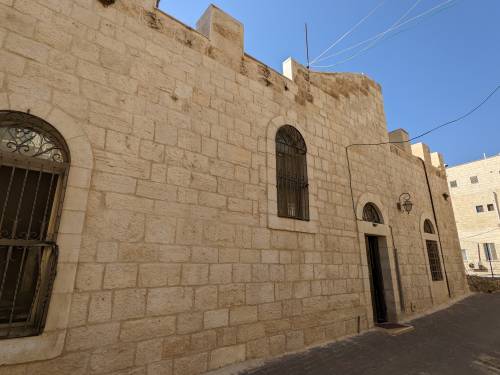 In this settlement, the land was purchased from its former owners; other settlement land is confiscated or expropriated by the Israeli government, and secure roads are then built by the government for settlement residents. This particular settlement, Efrat, is a planned town of about 15,800 people that is self-contained with stores, schools, synagogues, community centers and its own city government. Like a middle to upper middle class planned community in the US, the homes and apartments share similar, approved design lines, the landscaping is regulated and well-maintains and the streets and sidewalks are in good condition. It is a family-friendly place to live and its entire population consists of modern Orthodox Jews. Eventually when all planned expansions are complete, it will be a town of 30,000 residents.
In this settlement, the land was purchased from its former owners; other settlement land is confiscated or expropriated by the Israeli government, and secure roads are then built by the government for settlement residents. This particular settlement, Efrat, is a planned town of about 15,800 people that is self-contained with stores, schools, synagogues, community centers and its own city government. Like a middle to upper middle class planned community in the US, the homes and apartments share similar, approved design lines, the landscaping is regulated and well-maintains and the streets and sidewalks are in good condition. It is a family-friendly place to live and its entire population consists of modern Orthodox Jews. Eventually when all planned expansions are complete, it will be a town of 30,000 residents.
Our speaker, a Chicago native, explained that he and his family were attracted to Efrat because of the religiously observant lifestyle and while one need not be a Jew to purchase a home there, all residents were. Speaking of Israeli or others of other faiths or cultures, he said “they’ wouldn’t feel comfortable here.”
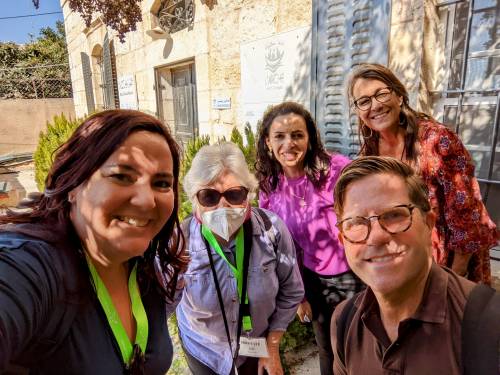 As a white, Southerner, I recall when other Southern whites used identical language to justify segregation. When asked to elaborate on why that was so, his answer revealed that similarly his concern was not others’ feeling but a disruption of the status quo, in which all shared the same culture and values. “We” for our speaker was his community of Orthodox Jews and he could only conceive of the peoples of Israel and the West Bank/Occupied Territories by dividing them into ethnic and religious groups, each with their own place. The Palestinians who enter Efrat most days to work in service jobs there are, in our speaker’s view, benefitting from their employment in Efrat and, “they” are happy with the arrangement.
As a white, Southerner, I recall when other Southern whites used identical language to justify segregation. When asked to elaborate on why that was so, his answer revealed that similarly his concern was not others’ feeling but a disruption of the status quo, in which all shared the same culture and values. “We” for our speaker was his community of Orthodox Jews and he could only conceive of the peoples of Israel and the West Bank/Occupied Territories by dividing them into ethnic and religious groups, each with their own place. The Palestinians who enter Efrat most days to work in service jobs there are, in our speaker’s view, benefitting from their employment in Efrat and, “they” are happy with the arrangement.
From what I have heard, seen and experienced in this Mosaic of Peace conference, only when those in power in Israel can put the energy and resources now spent on division and control, usually military, into working with the other people who inhabit this land as equal human beings, with equal needs will “they” become a part of “we”.
Regardless of any ultimate political solutions – one state, two state, etc – the first step must include recognition of common worth of human beings and actions that affirm that recognition. Efrat’s spokesperson could learn from both the staff and residents of L’Arche Bethlehem.
